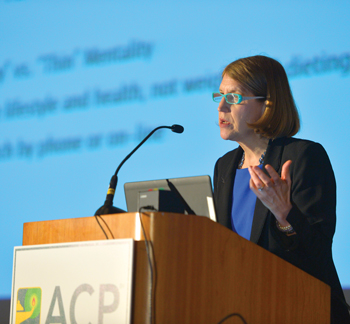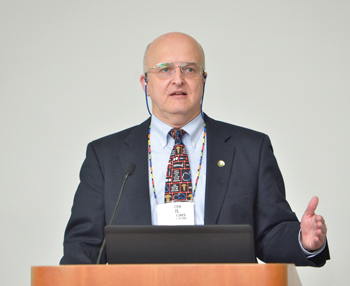ACP's ‘big tent’ advocacy agenda
ACP's advocacy on legislative and regulatory issues extends beyond partisan political debates and is meant to help physicians in their pursuit of clinical care.
One of the things that may not be apparent to many rank-and-file ACP members is the breadth and depth of the College's advocacy agenda. If there's an issue that affects the medical profession and patient care, the odds are that ACP is addressing it. Even if an individual member disagrees with ACP's stance on, say, addressing firearms violence, we likely are tackling other issues more aligned with that member's views. Think of it as a “big tent” advocacy agenda, one that encompasses the breadth and depth of issues of concern to internal medicine physicians, rather than a more narrowly focused agenda that would appeal to only a segment of the College's membership.
Here are some examples. If you are concerned about the crushing administrative burden that is being imposed on physicians and patients (and who isn't?), the College has your back. It recently released a position paper, “Putting Patients First by Reducing Administrative Tasks in Health Care,” which was published March 28 in Annals of Internal Medicine. The paper documents the adverse impact on patient care and professional satisfaction associated with administrative tasks imposed by insurers, federal regulators, and other external entities.
The paper doesn't just identify the problem; it proposes a framework for rigorously evaluating current and proposed tasks based on the intent of the task (why are physicians being asked to complete the task?) and its impact on doctors and patients (how does it affect time with patients, professional satisfaction, and practice costs?). ACP is using the criteria to engage in discussions with insurers, the federal government, EHR vendors, and others to identify tasks that could be eliminated or modified because the intended benefit doesn't justify the burden imposed.
Concerned about health care disparities? ACP has comprehensive policies to address disparities based on race, gender, gender identity, and sexual orientation and is developing more robust policy on women's health disparities. What about access to care? The College is leading the effort within the medical profession to stop Congress from rolling back coverage for millions.
Concerned that performance measures don't measure the things that really matter, while requiring physicians to report on things that don't? The College has this covered as well: We provide regular feedback to measure developers and the federal government on ways to simplify, streamline, harmonize, and make more clinically relevant the measures being used to assess physician performance.
What about the opioid epidemic and substance use disorders? We've got this as well: A new position paper published online in Annals of Internal Medicine on March 28 offers a comprehensive set of proposals to address substance use disorders as more of a public health issue and less of a criminal justice issue, with an emphasis on treatment rather than incarceration for nonviolent users.
Bothered that internists are underpaid for their services? ACP is on top of it, directing a large part of the College's advocacy resources toward successfully getting Medicare and other payers to pay for the work involved in managing patients with chronic conditions, prolonged services, and other services that historically have not been paid for at all. And the College continues to advocate for new models of payment and delivery, like patient-centered medical homes, that would provide practices with substantial new revenue opportunities to support patient-centered care.
What about medical liability reform? The College has developed a position paper that affirms its continued support for caps on noneconomic damages but also explores innovative alternatives like no-fault health courts. The new administration and Congress are likely to be more receptive to ACP's ideas than previous ones.
Concerned about public health? The College is committed to advocating for necessary funding for the Centers for Disease Control and Prevention; for addressing the threat of Zika, Ebola, and other infectious diseases; for developing new research on firearms injury prevention; and for mitigating the health consequences of climate change.
What about the roles of physicians, nurse practitioners, physician assistants, pharmacists, and other clinicians in creating dynamic clinical care teams? The College's position paper “Principles Supporting Dynamic Clinical Care Teams,” which was published in the Nov. 5, 2013, Annals of Internal Medicine, lays out a vision for dissolving the barriers that hinder the evolution toward dynamic clinical care teams and nimble, adaptable partnerships that encourage teamwork, collaboration, and smooth transitions of responsibility to ensure patients' needs are met.
Troubled by rising drug prices? ACP is the leading physician voice in the Campaign for Sustainable Rx Pricing, a multistakeholder coalition that is lobbying Congress and other policymakers to lower excessive prescription prices by requiring greater transparency and reducing barriers to lower-cost competitors.
I could go on and on with examples, but the best way to explore the breadth of the College's advocacy agenda is to explore our “Where We Stand” advocacy landing page, where one can search our public policy virtual library by keyword to find out what ACP is saying about any given issue (click on the “ACP Policies & Recommendations” link on the right-hand side of the page).
The College's “big tent” agenda belies the notion that we are a “liberal” or “conservative” advocacy organization. Sure, some of our positions, like advocating for universal coverage and addressing climate change, might be viewed as being left-of-center; others, like medical liability reform, may be viewed as right-of-center, at least as currently defined by American politics. Most, though, don't fit into the usual political labels: How are reducing unnecessary administrative tasks, improving quality measures, lowering drug prices, improving care of patients with substance use disorders, and advocating for better payment for internists' services liberal or conservative issues? Instead of trying to define ACP as right or left, think of us as an organization that strives to do what is right for patients, so that they aren't left behind by a health care system that too often puts the economic interests of the medical-industrial complex and an overly intrusive government above the people they are supposed to serve.




